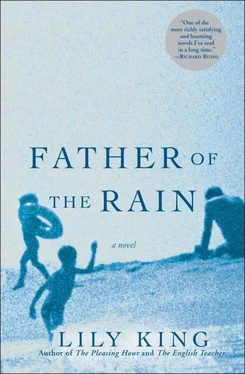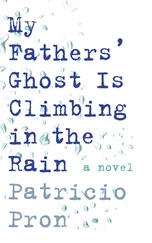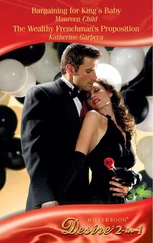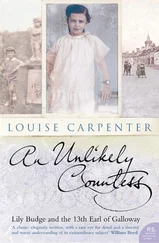“Morning,” I say, my bag knocking through the doorway.
“Well, if it isn’t Little Orphan Annie,” my father says, lowering his paper. Then he gets up and takes the bag from me. “Christ, what’d you do, steal the silver on the way out?” He puts it by the door. “Coffee?”
Nearly every morning he’s offered me coffee and I’ve always said no. I like feeling a little sleepy at the start of the day, and he drinks instant. “Sure,” I say. “Thanks.”
He gets down a cup and saucer, white with pale pink flowers. They rattle so loudly together he carries them in separate hands to the stove.
I wish I’d said no to the coffee. I need to get out before he blows up or collapses.
“What are you going to do today?”
“Beats me. Perry hurt his ankle again so tennis is canceled. I need to vacuum the pool. I never showed you the new vacuum.”
“The meeting’s at one today. You know that, right? Because it’s Sunday.”
“Yup,” he says, heading toward the door where the dogs are scratching to come back in.
They go directly to their places surrounding his chair.
I wait for him to tell me that at one he’ll be pouring his first martini.
“I can call you every night, see how it’s going.”
“You don’t need to do that. We’ll be fine here.” He pats the gray dog’s head, and the others lift their heads hopefully. “Don’t spend too much time inside. It’s not good for you. Get out and see the sun. Play a little tennis. You got your racquet? You didn’t get it, did you? You take that with you. Early birthday present.”
“Belated, actually. My birthday was two weeks ago.”
“All right then.”
“This is a real opportunity for you, Dad.”
His eyes are looking straight ahead, unfocused. He nods. “Today is the first day of the rest of your life.”
I’ve spent so many years swallowing my feelings for my father, constructing a glib false self that sloughs off his jabs, evades questions, conceals facts that would displease him, that now I have a hard time finding the truth in his presence.
“You have been so strong this week. I know you can keep going.” Ninety meetings in ninety days is what they say. If you can make it that far, a return to drinking is much less likely. “Ninety in ninety. Do you feel like you can do it?” They also say, of course, one day at a time. Maybe I should shut up.
“Everyone leaves me.” He says it so quietly it takes me a second to understand what he’s said. It’s less than a whisper, as if it has just emanated up through him, despite his efforts to quell it.
Everything is silent after that. Even the dogs’ collars, a steady white noise in my father’s house, are still.
I put my hand on top of his, the raised veins pulsing hard against my palm. “I’ll call you every night.” And then I add, awkwardly, it has been so very long: “I love you, Dad.”
He nods and lets out a long breath.
The dogs chase my car down the driveway, then turn back to my father, who is still standing there, his hands in his pockets, in the shadow of the garage. He isn’t yelling at them as he usually does. When they reach him, he puts his hands on their heads and then turns toward the house. The slope of his back disappears behind the trees.
People are already walking up the hill to the beach, even though it’s only nine-thirty on an overcast day. The Ferris wheel is motionless. A big banner announces the carnival will open up again at noon. I have missed my chance. Kids are already circling the area on bikes, waiting. Lighthouse Books has a CLOSED sign dangling from its door-knob. The Congregational Church’s doors are flung open, the organ playing. The Bridgetons will probably ask my father over for cocktails this week. On Water Street the shades are down in the front windows of our old apartment. I turn up Middle Street, toward the highway. The green signs appear, the regular white paint replaced now by a reflective silver. Route 4 North and Route 4 South. I’ll take Route 4 South to 95 to 90, fork off to 80 in Ohio, and take 80 all the way to Berkeley. My father will not go to another AA meeting. I pass the Route 4 North on-ramp, put on my blinker for the next, but go straight under the overpass toward the town dump. Beyond the dump, in what used to be woods, a new subdivision has gone up. I turn into the long, newly asphalted drive and follow its smooth perfect circle past the freshly built houses, then turn back on Middle Street, back toward town.
He is standing at the pool when I pull up. There’s a thick cord that runs from the poolhouse right into the water. I walk across the grass. At the bottom of the pool is a little white box moving all by itself, sucking up all the dirt in a straight line. When it hits the side it turns and goes in a different direction. It is only when I am standing right beside him that he lifts his eyes.
“You know who the Sox are playing at one, don’t you?” he says.
“The Yankees?”
“But you’re going to make me go to that meeting.”
“Yup.”
“Shit.”
Then we watch the new vacuum make its clean random tracks across the bottom of the pool.
I call the chair of the anthropology department that afternoon. I’ve rehearsed a few phrases in my head, but once the phone begins to ring I forget them. A teenager answers eagerly. I didn’t imagine Oliver Raskin with a family. He’s out in the field for years at a time, has written over twenty books. This young voice gives me hope that as a family man, Dr. Raskin will understand my situation. The phone is dropped on a table and more than a few minutes later he picks up an extension.
“Please forgive me for calling you at home on Sunday, Oliver.”
“Not at all.” He speaks from a small silent room. “I’m sure you have questions, Daley. Fire away.”
“I am not able to come to California right now.”
“The project doesn’t start until Wednesday. I thought that was clear.”
“It is clear. I can’t get there by then. My father is sick.”
“I’m sorry, Daley.” I can’t tell if he means he’s sorry about my father or sorry that my father’s sickness doesn’t change anything. “What’s the matter with him?”
“It’s complicated.”
“I’m listening.”
I’m not sure why I thought he might understand. I can tell by his breathing he won’t.
“He’s going through a rough—”
“Is he dying , Daley? Because for you not to be here on the ninth of July he would have to be dying.”
“I worry that he will die if I don’t stay.”
“If you stay, he won’t die. If you leave, he will die.” I can hear him take a sip of something. “Are you a god, Daley?” I wonder if he’s drunk. “You signed a contract, if you will remember, in which you agreed to begin your research here in a few days. You may have ten more, if you think you can work your magic in that time.”
“I’m going to need more than that.”
“How many more?”
Ninety in ninety. “Three months.”
Silence. Another sip. More silence. “In other words, you’ve called to resign.”
“It’s a family emergency. I’d hoped I could have some sort of deferment.”
“This is not like applying to college. This is not a custom design situation. This is one of the most coveted positions in the country. We considered over a hundred applicants. We flew five candidates out here. The selection process took up the whole year.”
“I understand that.”
“Are you really my next suicide, Daley?”
I don’t want to work with this man. He’s a prick. “No, I’m not, Oliver. I guess I’m your first defection.”
The phone rings during dinner. My father answers.
Читать дальше












